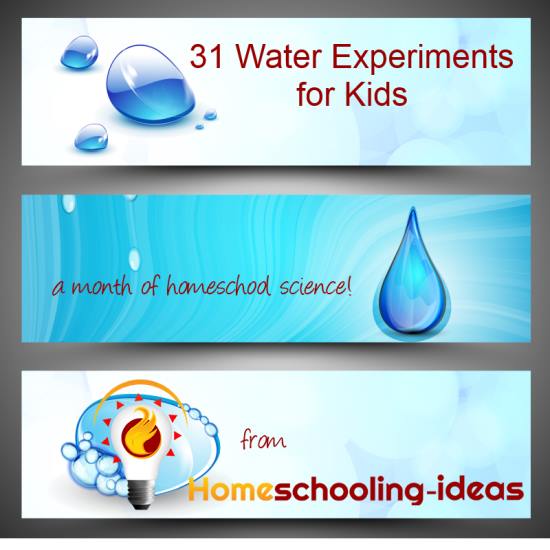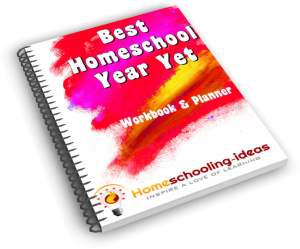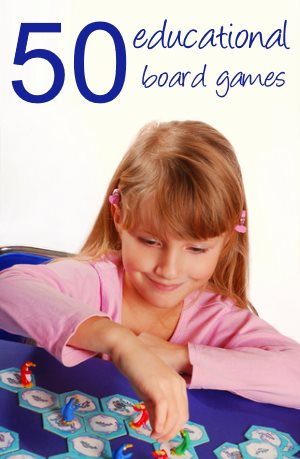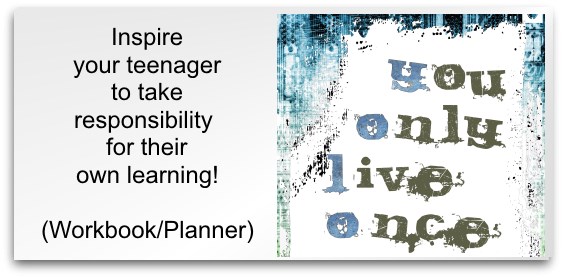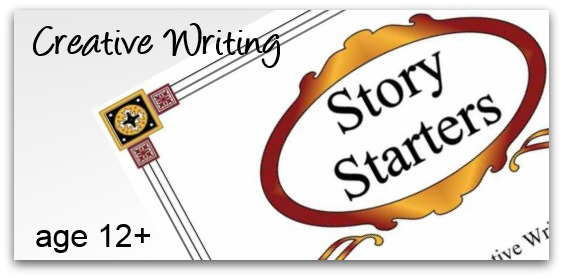31 Water Experiments for Kids
A Month of Homeschool Science
When my children were small we used the following article to do a month of science water experiments (one a day), and we recently used them again (with more detailed scientific explanations) as part of our homeschool science.
Although the science experiments seem quite simple to begin with, they actually cover a lot of scientific principles.So I was really thrilled when the author of the article, Faith Hickman Brynie, agreed to let me share the article in full with you here.
We had a lot of fun with these water experiments, and hope you do too!
Water Play? A Lesson a Day!
Water Experiments By Faith Hickman Brynie
This article on water experiments is copyright by Faith Hickman Brynie, and is published here with kind permission of the author.Children are natural scientists. They're always full of questions, always eager to explore the world around them. You don't need much time, money, or equipment to nurture your child's curiosity. It's enough just to take advantage of the opportunities for learning that pop up every day.
Water is one good example. It's clean, cheap and readily available. Children love water play, and turning play time into active learning is easy. This month, why not try a water 'lesson' every day? Discovering some wonderful things about water could be as much fun for you as for your child!
Here's a parents guide to the science behind the experiments |
- Drop a single drop of food coloring into a glass of water. Don't stir or shake. Just watch what happens. (It's called diffusion.)
- Use a medicine dropper to drop water onto a penny, one drop at a time. How many drops will the penny hold before the water spills? (The answer may surprise you!)
- Try the same water experiments as #2 with water that has a little detergent in it.
- Try the same thing as #2 comparing the heads and tails.
- A lump of clay sinks. Change its shape to make it float.
- Dunk sieves and colanders in water. Pour water through funnels. What does the size of the holes have to do with how fast the water flows?
- Compare the sizes of containers by filling one with water, then predicting whether another will hold more or less. Test your prediction.
- Measure volumes of water using measuring cups and spoons. Weigh measured volumes of water on a diet scale. (Don't forget to subtract the weight of the cup that holds it).
- Simulate erosion by pouring water onto a "mountain" of sand or dirt. Experiment to find out whether some soils resist erosion better than others.
- Select some household objects. Predict which will sink and which will float. Test predictions at bath time.
- Make a boat from a margarine tub. Predict how many pennies it will hold before it sinks.
- Test different types of sponges to see which hold more water.
- Float an apple in fresh water. Make it float higher by adding salt to the water.
- An orange floats, but without its peel it sinks. Build an artificial peel that will enable an orange to float.
- Is it easier to move through air or through water?. Do an experiment to find out.
- Does sound travel better through air or water? Experiment to find out.
- What happens when salt dissolves in water? Make some salt water, then leave it in a warm place for a few days. What happens? Why?
- Repeat water experiments #17 with a mixture of vinegar and water. Are the results the same?
- Sprout bean seeds in soil. Then give the seedlings measured amounts of water at scheduled intervals. Give one group of seedlings no water, another a moderate amount, and a third a lot. Keep records of growth.
- (For safety, an adult demonstration for a child.) Hold a cold surface (such as the bottom of an ice-filled glass) over the spout of a steaming kettle. What collects on the surface? Why? Is this like rain?
- Make a chart showing all the ways your family uses water
- Can water move uphill? Cut a strip of coffee filter paper or a paper towel. Hold the strip so the bottom barely touches the surface of the water. What happens? Build a tower of sugar cubes in a shallow dish, then add a little colored water in the bottom. Watch the result.
- "Paint" abstract watercolor pictures by floating some oil on the surface of water. Add drops of different food colors here and there. Place absorbent paper flat on the surface of the water, then lift.
- Fill a glass about half full of water. Add salt and stir until you have dissolved as much salt in the water as possible. Color the solution blue and chill over night. The next day, color some hot water yellow but add no salt. Tilt the container that holds the cold, blue water and gently pour the hot, yellow water down the side. The solutions won't mix. The yellow layer will float on top of the blue layer. (This happens because the cold, salty water is denser than the hot, fresh water).
- Investigate the absorbency of different materials by cutting pieces all the same size, wetting each thoroughly, then measuring the amount of water you can squeeze out.
- Measure the diameter and depth of puddles. Record how long they take to dry up. Does size seem related to drying time?
- Hang swatches of different types of wet fabrics on the clothesline. Do some take longer to dry than others? Why?
- Test foods to see which dissolve in water. Try cornstarch, sugar, butter and nutmeg.
- Invent a way to keep a matchbox dry when immersed. Test various designs.
- Prop a pocket mirror at an angle into a glass of water and set in a sunny windowsill (or shine a flashlight on it). Tilt the mirror until you find the angle that makes rainbows dance on the wall.
- Stir one cup of cornstarch into 1/2 cup of cold water and mix thoroughly. Will the mixture pour? Will it make a ball? What happens when you press your fingers into it?
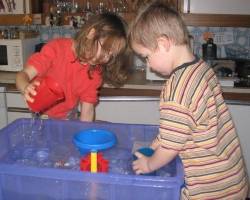
Just as water is all around every day, so are other materials and ideas for fun science learning children and parents can share. Get in the habit of observing, questioning and experimenting every day!
Faith Hickman Brynie is the author of several science and health books for children and young adults, including Parent's Crash Course Elementary School Science Fair Projects

I hope these water experiments are helpful to you in your homeschool science!
Looking for more science ideas?
Homeschooling-Ideas › Homeschool Science › Water Experiments
Lovely messages sent from visitors like you:
Oh my goodness! I am a home schooling mum of 4 and I have NEVER found a better site! Thank you so much.
Blessings, Jenny (New Zealand)
I wanted to say THANK YOU for your fabulous website. I found your website, and finally I have the confidence to take the plunge and take my daughter out of school and educate her at home, thank you, thank you.
Marina (UK)
I cannot get over how much great information and super ideas you have here. Fantastic!
Ruralmama (USA)
This is simply fabulous!! I just now found this site and I'm so excited!! The opportunities and suggestions as well as the need to inspire are exactly what I have been searching to fulfill!! I'm so thrilled to get started and even more excited to continue to explore all of the fabulous suggestions and creative ideas you have offered here!!! Thank you, thank you, thank you!
Jennifer (USA)

